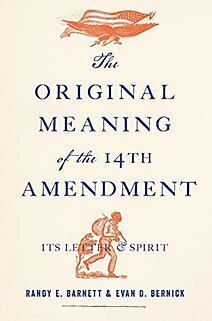The Fourteenth Amendment, ratified three years after the Civil War, profoundly changed the Constitution. It gave both the federal judiciary and Congress new powers to protect individual rights from being violated by the states. Yet, as Randy Barnett and Evan Bernick describe in their new book, the Supreme Court has long misunderstood—or ignored—the original meaning of the amendment’s key clauses, which cover the privileges and immunities of citizenship, due process of law, and equal protection of the laws. The authors contend that the Fourteenth Amendment was the culmination of decades of debate about the meaning of the antebellum Constitution, and was informed by natural rights, the Declaration of Independence, and common law. When abolishing slavery proved insufficient to thwart state repression and provide for civil equality, the Fourteenth Amendment enshrined the concept of republican citizenship and granted Congress the power to protect fundamental rights and ensure equality before the law. Congress used that power to pass Reconstruction-era civil rights laws that tell us much about the amendment’s original meaning. Please join Randy Barnett and Evan Bernick to discuss their new book, with commentary by Judge David Stras.





